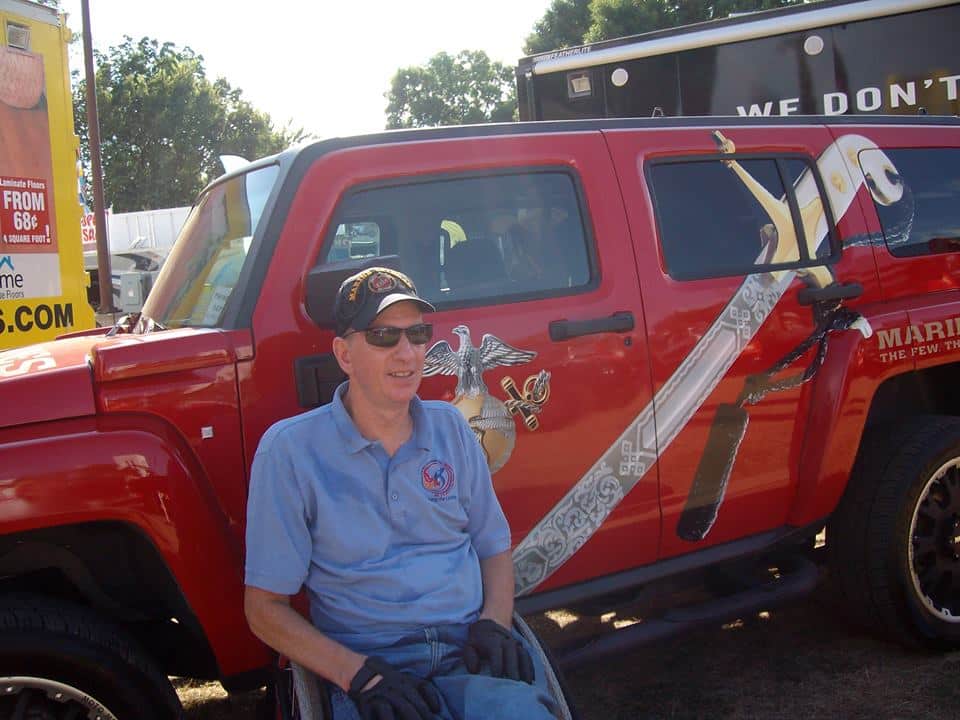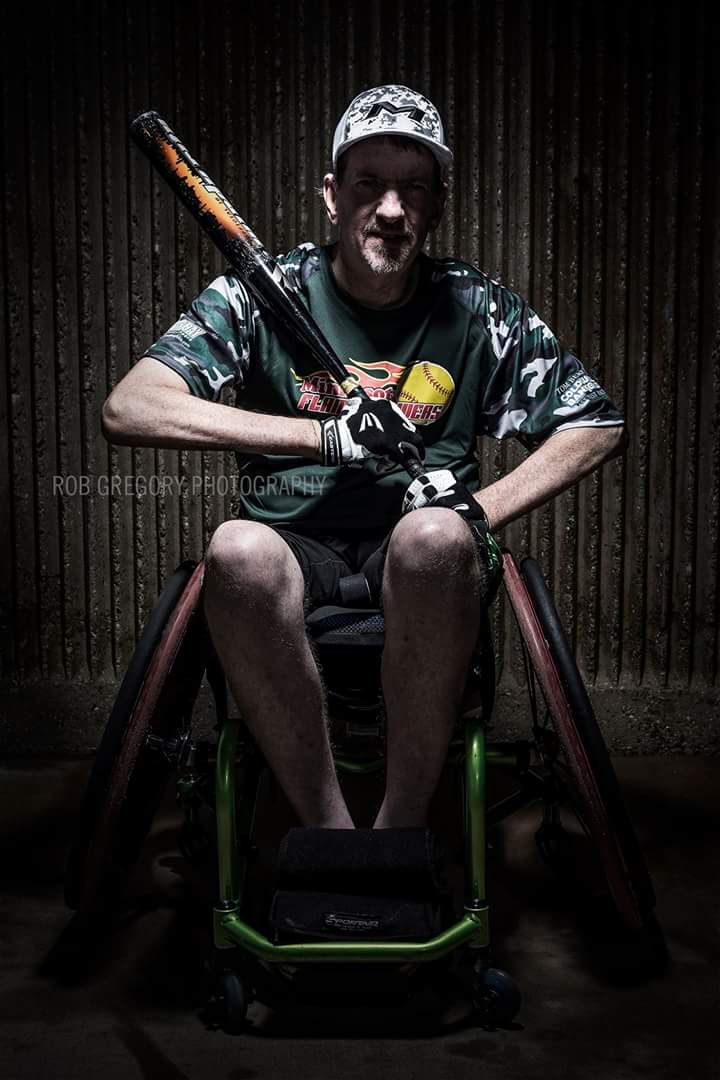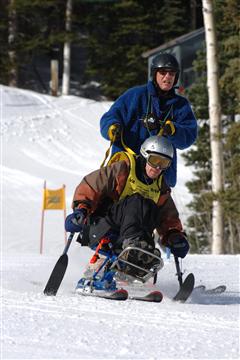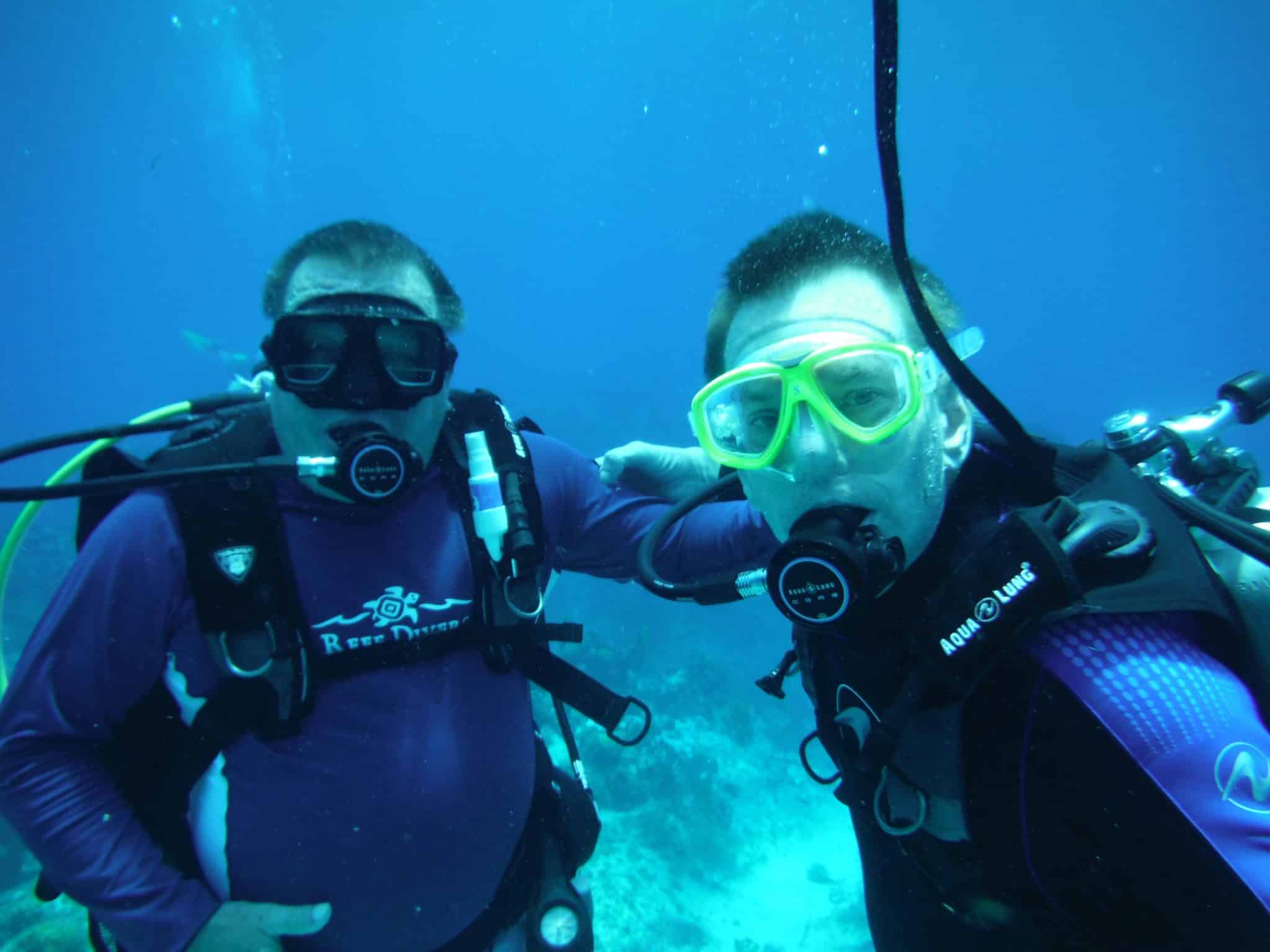Editor’s Note: Just a couple of weeks before finishing his military service and a day shy of his 22nd birthday, Marine Todd Kemery went to the beach on his day off. While surfing that morning, a wave pulled him under, and he sustained a C5-C6 spinal cord injury. Kemery talked to Wheel:Life about moving on post-injury, starting a career, and how Coloplast’s Peristeen helps him lead an active lifestyle as a man with tetraplegia.
I didn't realize the seriousness of my injury until my father walked through the door of my hospital room. I couldn't figure out what he was doing in California from Pennsylvania. That’s when the cold reality dawned on me that this wasn't going away.
As a Veteran, part of healthcare at the time was going to a Veterans Affairs SCI rehabilitation center. Since I was from the East Coast, the McGuire VA Medical Center in Richmond, Virginia, was the best place for me to go. So, they medevaced me to Richmond, to start my rehab process.

At that time, if you were paralyzed in all four extremities, you could almost guarantee you'd be in rehab for 12 months. I was an incomplete injury, so from the very beginning and throughout rehab, I had little bits of return. At one point, I asked my doctor how long I'd have to stay in rehab, and she said, "Corporal Kemery, when you can get from the floor to your wheelchair unaided, I'll let you go home.” So, that was my goal — to get from the floor to my wheelchair to simulate if I had fallen out, and no one was around to help me. This is very challenging with such impaired physical abilities. I did that in six months. Back then, if you exhibited that type of ability as you were going through rehab, they called you a “super quad.”
I'm not going to say there weren't any periods of darkness and wondering why I was working so hard, but there was a task at hand, and the Marine Corps had given me the tools to succeed at my goal of getting out of that rehab center. It wasn't until I left rehab that I began to understand how depression can set in after a life-altering event.
When I joined the Marine Corps, I wasn't expecting to go back and live with my parents afterward. However, that was the only place that made sense at the time. So, my parents had their home adapted with accessibility features so I could live there while planning out what to do next.
I don't remember much of 1983 because of the depression I fell into. I found out the hard way that not having goals would lead to sitting around the house, and alcohol and drugs quickly became part of my lifestyle. That's why I don't remember much of 1983 because I was in a stupor most of the time. There was a natural progression toward depression because I hadn't thought about or been forewarned that this could happen if I didn't set some personal goals. Without any goals, the reality of the situation sets in even more, and depression follows.
I had a visit from a friend I had made while in rehab who lived in Maryland. He was a higher-level quad, and he drove up to my house in Pennsylvania in a brand new 1984 Monte Carlo. That was a cold slap in the face. I thought to myself, “If Daniel, who’s in much worse shape than I am, can drive and be independent, then I can certainly start moving forward.” So, I decided to go to college to start the process of moving on and creating new goals for myself.
A few years later, I graduated with a degree in business management and a minor in government. I had no idea what I wanted to do with that, but I knew some people with business degrees, and I thought I'd see where it went. I didn't know at the time that my minor in government would be very beneficial for my future work.
As I got older, I found I had a knack for advocacy, and not only do I enjoy the process, but I've also been very effective at it.
Some friends I went to college with had started their careers in sales, and they had a job opening at the Mall of America in Minnesota. The farthest thing on my mind was going into sales, but it was an opportunity to start a résumé. At that time, the prospects for a quadriplegic to be gainfully employed were zero to none. So, I moved to Minnesota to work on the sales team at the Mall of America.

Eventually, I moved away from sales. I started working with Paralyzed Veterans of America 17 years ago as the sports director. It was a good fit because I was heavily involved in wheelchair sports. At one point, I also took on the roles of the advocacy and legislative director. When we were able to bring more people in, I no longer had to do all three. Today, I'm still part of the advocacy and legislative team.

I'm still in Minneapolis today. My original plan was to start a résumé, and after a couple of years, go somewhere warm like California or Arizona. But moving to Minnesota made me realize what life could be like in a wheelchair. The Minneapolis area was very progressive when it came to the disabled community, and I found many opportunities to be active. I've played quad rugby, wheelchair softball, and everything in between.
I've stayed active all of my 35 years in a wheelchair. Scuba diving is my latest endeavor. I'm a recruiter for Dive Buddies, which is a certification process for able-bodied people to learn how to assist a person with a disability when diving. Diving is very therapeutic, and water sports are a great way to involve all of your muscle groups and stay in shape.
It’s important to stay active, whether mentally or physically, because you need to occupy your time. Depending on the level of injury, it's not always feasible or manageable to be physically active, but that doesn't mean you can't keep your mind active. Although I’ve always been involved in sports, I've also found a passion for advocacy and legislation. We need more people to step up and advocate within the disability community. It not only helps the community as a whole, but you're doing yourself a favor by staying mentally active.
Coloplast’s Peristeen was a game-changer for me. With any spinal cord injury, bodily functions below the injury site slow down significantly. As a result, monitoring your bowel and bladder becomes essential. You have to teach your body a schedule in order to avoid accidents. There are various ways that people do that, but until Peristeen came along, that process took a very long time for me. From start to finish, a bowel movement consisted of around five hours of sitting on the toilet.
Most people schedule their bowel routine every other day to every two days. In general, the longer you go between bowel movements, the more constipated you'll be. With Peristeen, you can do it daily if you need to with much less time.
I'm in my third year using Peristeen, and it has allowed me to reduce my bowel care routine from five hours to around 45 minutes. I no longer have to cancel a whole day when it comes to my bowel care management. Peristeen allows me to spend less time in the bathroom. Whether you're involved with sports, recreation, or a job, less time tied up in the bathroom allows you to have a lot more on your schedule.

I remember my beginnings as a quadriplegic like it was yesterday. It sounds cliché, but as a peer mentor, I always tell the newly injured people I meet not to give up. You need to keep moving forward. Whatever it is that you can still do, you need to do it. Challenge yourself with new experiences as well.
Every year, I get to help recruit participants for the National Veterans Wheelchair Games. There are a lot of benefits that go along with competing. The games are in a different location every year, which means you get to travel. Learning to travel with confidence is an important step when you're first injured. One of the biggest hurdles for me was the stress of figuring out how to get from point A to point B in a wheelchair. What if something bad happens while I’m in a new destination? How am I going to deal with it? Thinking outside of your hospital room or even your home is an important first step.
Part of what I try to instill in people is the value of giving yourself new experiences. If all you can do is get on a bus or drive yourself to the mall, you should at least be doing that. If you're able to challenge yourself further, then do that. When you get outside of your comfort zone, you begin to learn and experience new things, and that develops confidence and stamina. Providing yourself with those opportunities is an overall self-satisfying process.
The first thing I learned about myself after my injury was that if I was going to have a future, I would need to be patient — patient with my situation, patient with myself, and patient with others — especially with others. In the beginning, family and friends are going to want to lighten your load by helping with everything. Until you and they learn your strengths and limitations, accept their efforts. Occasionally, it's okay to ease up on being fiercely independent.
Editor's Note: All information contained in this article was extracted from an interview and email communication with Todd Kemery. It has been lightly edited for clarity and length.

Betsy Bailey has a diverse background that includes experience in travel and culinary writing, business operations, marketing research, and playing volleyball professionally overseas.
Betsy has been writing for Wheel:Life since January of 2017 and thoroughly enjoys the process of getting to know her interviewees. She also enjoys a good vegan brunch, practices parkour, speaks French fluently, and travels any chance she gets!